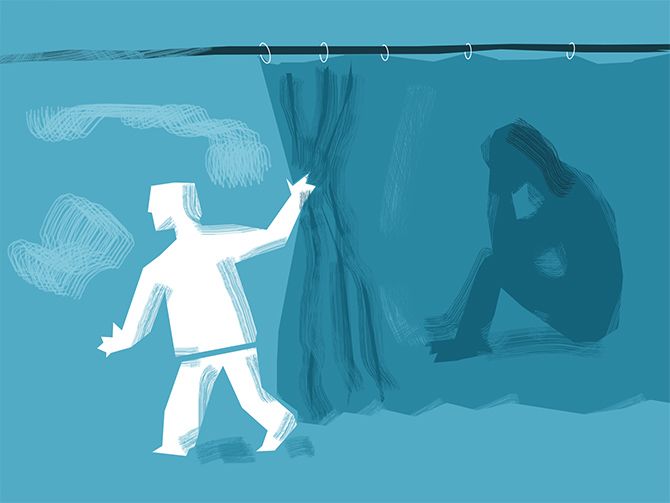If individuals continue to view mental illness with apprehension and resistance, it will remain difficult for people with mental health concerns to seek the support they require, says Shyamal Majundar.
Illustration: Dominic Xavier/Rediff.com

Recently, Siddhartha Mukherjee, a Pulitzer Prize winning author and a world-renowned doctor, raised an important point on mental health issues. The doctor drew parallels between the stigma that cancer faced in the 1950s and that mental health faces today. Cancer patients, he said, "were then stuffed in the back of hospitals" till increasing awareness removed the stigma attached with the illness. His talk at a public event centred around three forces, which he felt needed to be addressed.
The first force is political -- for mental health to be recognised as a public health crisis, stakeholders in the political domain must come together and work towards setting up national institutes for mental health.
The second force is social -- advocacy on destigmatising mental health. In the case of cancer, women like Rose Kushner, Betty Ford, and 'Happy' Rockefeller played an important role, helping the focus to shift to "empathy, a desire to relieve suffering, and a want to cure and to treat".
Mukherjee, who is also an assistant professor of medicine at the Columbia University Medical Center, said mental health requires such advocates.
And the third force is biological -- genetic or pharmaceutical. This entails making efforts and carrying out research to understand the molecular mechanism so that people having mental health issues would not be victimised.
He should know from personal experience, as he has two uncles who have schizophrenia and bipolar disorder. One of his cousins was also diagnosed with schizophrenia and institutionalised. Mukherjee had initially blocked out anything to do with mental illness and didn't want to understand it partly because he was "too fearful of understanding" till the time he picked up courage to write a book, The Gene: An Intimate History.
The doctor is bang on.
In India, as in many parts of the world, the first reaction of mental health patients and their families is denial. Most are bent on convincing the doctor that the diagnosis is a colossal error, or that the so-called broken psyche would mend itself. That's because of a lack of awareness that all mental health patients are not lunatics and the disease is entirely curable if detected on time.
One of the main reasons for this is the acute shortage of mental health consultants in India. According to the World Health Organization (WHO), there were 0.301 psychiatrists and 0.047 psychologists for every 100,000 patients suffering from a mental health disorder in India.
The lack of mental healthcare workers, however, is hardly a new issue. In 1982, the government began implementing the National Mental Health Programme with the broader aim of integrating mental healthcare with general care. But rollout has been slow. As of 2015, more than three decades after the programme launched, it has been prevalent only in 27 per cent of districts.
The recently conducted National Mental Health Survey says the treatment gap of any mental disorder in India is as high as 83 per cent, and around 150 million people in India need care for their mental health condition.
Corporate India also needs to take this seriously. It is alarming that 42.5 per cent of the employees in the private sector suffer from depression or some form of anxiety disorder. The WHO estimates that India will suffer economic losses amounting to $1.03 trillion from mental health conditions between 2012 and 2030.
Poor communities also tend to ignore mental illnesses as they are not obviously disabling. People very rarely die because of them, and families that struggle to make ends meet do not consider that mental health is something that money should be spent on.
In 2018, the Live Love Laugh Foundation, a charity that aims to create awareness on mental illness, commissioned a study, 'How India Perceives Mental Health', across eight cities in India. The study showed that while 87 per cent of the respondents had some awareness of mental illness, 71 per cent also used terms associated with stigma. More than a quarter admitted that they would always be indifferent towards people with mental illness.
That needs to be addressed urgently. If individuals continue to view mental illness with apprehension and resistance, it will remain difficult for people with mental health concerns to seek the support they require. That is where institutions supported by the government have a huge role to play.












 © 2025
© 2025